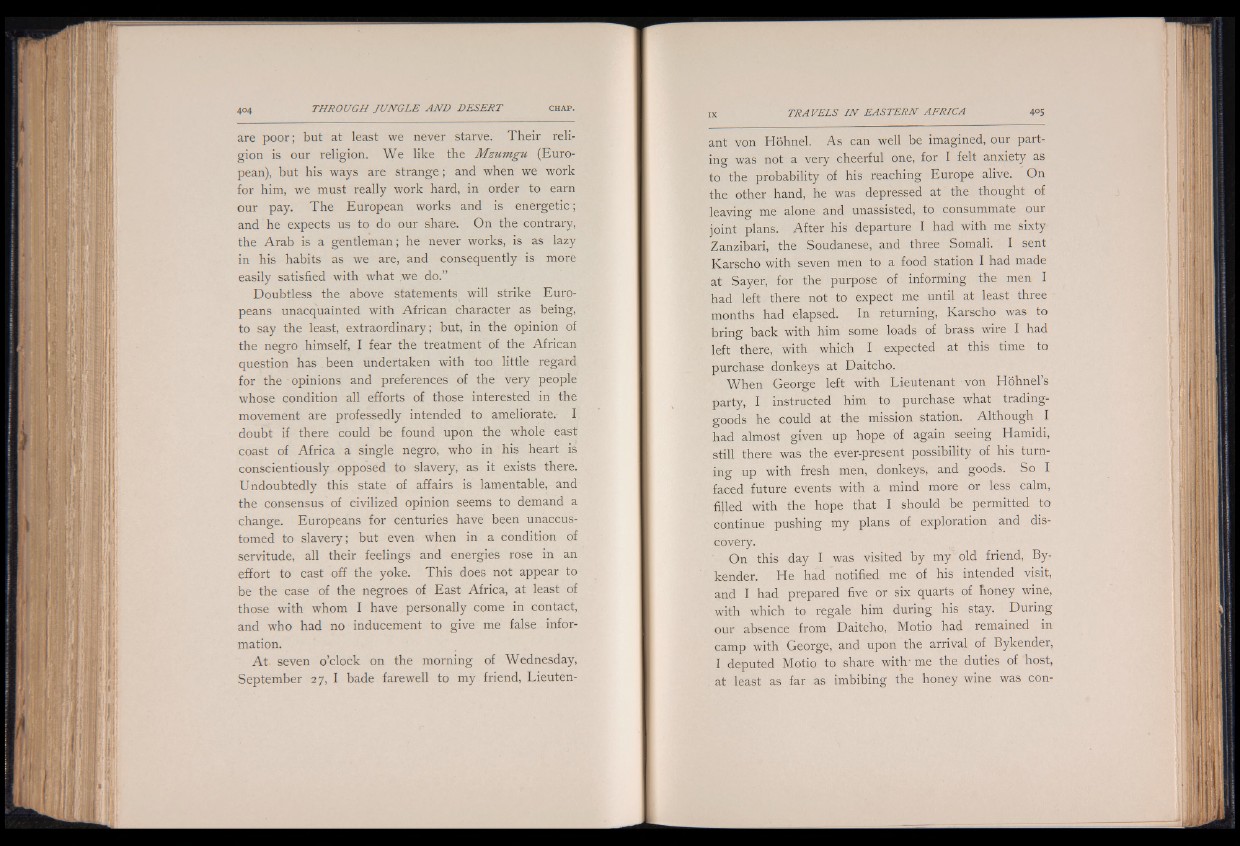
are poor; but at least we never starve. Their religion
is our religion. We like the Mzumgu (European),
but his ways are strange; and when we work
for him, we must really work hard, in order to earn
our pay. The European works and is energetic;
and he expects us to do our share. On the contrary,
the Arab is a gentleman; he never works, is as lazy
in his habits as we are, and consequently is more
easily satisfied with what we do.”
Doubtless the above statements will strike Europeans
unacquainted with African character as being,
to say the least, extraordinary; but, in the opinion of
the negro himself, I fear the treatment of the African
question has . been undertaken with too little regard
for the opinions and preferences of the very people
whose condition all efforts of those interested in the
movement are professedly intended to ameliorate. I
doubt if there could be found upon the whole east
coast of Africa a single negro, who in his heart is
conscientiously opposed to slavery, as it exists there.
U ndoubtedly this state of affairs is lamentable, and
the consensus of civilized opinion seems to demand a
change. Europeans for centuries have been unaccustomed
to slavery; but even when in a condition of
servitude, all their feelings and energies rose in an
effort to cast off the yoke. This does not appear to
be the case of the negroes of East Africa, at least of
those with whom I have personally come in contact,
and who had no inducement to give me false information.
A t seven o’clock on the morning of Wednesday,
September 27, I bade farewell to my friend, Lieutenant
von Hohnel. As can well be imagined, our parting
was not a very cheerful one, for I felt anxiety as
to the probability of his reaching Europe alive. On
the other hand, he was depressed at the thought of
leaving me alone and unassisted, to consummate our
joint plans. After his departure I had with me sixty
Zanzibari, the Soudanese, and three Somali. I sent
Karscho with seven men to a food station I had made
at Sayer, for the purpose of informing the men I
had left there not to expect me until at least three
months had elapsed. In returning, Karscho was to
bring back with him some loads of brass wire I had
left there, with which I expected at this time to
purchase donkeys at Daitcho.
When George left with Lieutenant von Hohnel’s
party, I instructed him to purchase what trading-
goods he could at the mission station. Although I
had almost given up hope of again seeing Hamidi,
still there was the ever-present possibility of his turning
up with fresh men, donkeys, and goods. So I
faced future events with a mind more or less calm,
filled with the hope that I should be permitted to
continue pushing my plans of exploration and discovery.
On this day I was visited by my old friend, By-
kender. He had notified me of his intended visit,
and I had prepared five or six quarts of honey wine,
with which to regale him during his stay. During
our absence from Daitcho, Motio had remained in
camp with George, and upon the arrival of Bykender,
I deputed Motio to share with' me the duties of host,
. at least as far as imbibing the honey wine was con